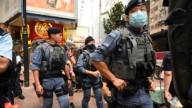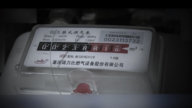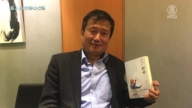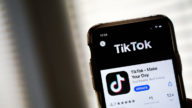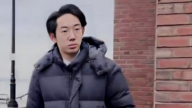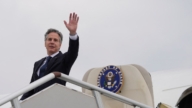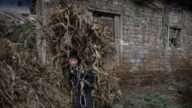【新唐人2014年01月13日讯】在前中共中央政法委书记周永康把持“政法委”期间,“政法委”曾被称为中共“第二权力中央”,被广为诟病“有法不依”。最近,在中共中央政法工作会议结束后,党媒发表评论员文章声称,“政法机关是党和人民掌握的刀把子”。而各地政法机关在讨论这次会议时,也悬挂起“要做党的刀把子”的横幅。“刀把子”是毛泽东时代的语言,曾经制造过“文化大革命”、“反右”等血腥错案,也遭到中共自己的否定。那么为什么新年伊始,中共就把它作为开年“吉庆”,拿了出来﹖我们一起来看看。
1月9号,中共喉舌《人民日报》发表评论员文章,题为《毫不动摇坚持党对政法工作的领导》。文章评论:政法机关作为人民民主专政的国家政权机关,是党和人民掌握的“刀把子”,必须置于党的绝对领导之下。
第二天,《央广网》、《光明网》等中共党媒,又发表题为《政法机关是党和人民掌握的“刀把子”》文章。
中共公安部副部长、纪委书记、督察长刘金国,在学习现任领导人习近平的讲话时表示, 政法机关是党和人民掌握的“刀把子”,公安机关是“刀把子”的刀尖和刀刃。
网络上也流传各地政法机关开会时悬挂的血腥横幅,“刀把子”三字突兀刺目。
中国权利运动发起人胡军:“网络发生大的变化,国内民间的维权不断的上升,冲突越来越大,所以现在我们就可以看到中共赤裸裸的把它以前的伪善的面纱扯掉了,不愿意被掠夺、被抢劫的话,他们就会利用专制的工具来屠杀老百姓。”
据党媒报导,公安部部长郭声琨,概括了习近平在政法工作会议上的讲话,分为“五个充分体现”,其中第一条就是“突出强调政法机关是人民民主专政的国家政权机关、党和人民掌握的刀把子,充分体现了坚定的政权观念。”
加拿大华裔作家盛雪:“在去年一年抓了这么多人,在舆论领域,在社会层面,在公民运动方面,打击的力度镇压的力度要比以前更狠,现在他的这些说法,被它自己的喉舌进行这样的解读,对社会上是一种威慑力,就更加难以有人敢于公开地去表述追求自由民主人权的这样的思想和立场。”
不过,“香港大学新闻及传媒研究中心”中国传媒研究计划主任钱钢,在“英国广播公司《BBC》”发表评论指出,习近平在讲话中,却是要求运用法治思维和法治方式领导政法工作。他甚至提到“宪法法律至上”,并严辞抨击司法腐败。
盛雪:“中国的法律恰恰是共产党用来统治社会,统治人民,制造冤案的这么一个机构,那么现在习近平不管怎么去喊,要进行反腐,要进行改革,要进行什么什么,如果不能够进行民主化改革的话,所有这些都是谎言。”
“刀把子”是毛泽东时代语言。国共内战时期,党报上的“刀把子”指“权力”,如关于土改、斗地主的报导中,有“贫农掌握领导权,刀把子拿到贫农手里”之语(1947年9月3日)。50年代,“刀把子”则开始专指“政法机构”。
钱钢认为,从2013到2014年,中共政治话语的错乱一再发生。各地会场高悬的“政法机关要做党的刀把子”一语,带着“阶级斗争为纲”年代的印记,公然践踏《宪法》。
旅美政论家胡平:“只有在中国这种国家才会有政法委这些东西,在正常的国家就是司法,法院,法律适应于每一个人,在法律面前人人平等。政法机关在共产国家里,在专制国家里,都是统治者用来对付别人的工具。”
钱钢评论认为,执政者(中共领导人)信誓旦旦:既不走老路,也不走邪路。“刀把子”却昭告:那条老路,无疑也是中国人公认的邪恶之路,已在近旁。
采访编辑/刘惠 后制/李智远
“Party’s Blade": China Politics and Law Committee New Year Message
During the time Zhou Yongkang was Head of the Chinese
Communist Party (CCP) Politics and Law Committee (PLC),
the PLC became known as a “Second Central Power".
It was widely criticized for acting in defiance of China’s laws.
Following a recent PLC meeting, state-controlled published
an editorial, claiming “the PLC is the blade of our party".
At local PLC bureau meetings, the slogan of “To Be
the Party’s Blade" was also hung on over head banners.
“Party’s Blade" is a term that was used in the Mao era.
It’s use directly resulted in bloody suppressions, such as
the Cultural Revolution and the Anti-Rightist Movement.
Having been negated by the CCP previously, why was
this theory presented again at the start of a new year?
Lets take a look at the following report.
On January 9, state-controlled
People’s Daily published an editorial.
It was called: “The Party’s Leadership over
the PLC Should Never Be Challenged".
The article said that as an administrative agency
of a “People’s Democratic Dictatorship regime",
the PLC plays the role of the party’s “blade".
Therefore, it has to be firmly “held” by the party.
The following day, other state media, including ‘cnr.cn’
and ‘gmw.cn’ also published an article called,
“The PLC Is the ‘Blade’ of Our Party and People”.
Liu Jinguo, Vice Minister and Disciplinary
Inspection Secretary for Public Security, led
a seminar studying Xi Jinping’s speeches.
Liu said that the PLC is the “blade" of the party, and the
public security department works as the blades edge.
Internet pictures clearly show the Chinese characters
of “blade” written on banners at local PLC meetings.
Hu Jun, Founder of China’s Rights Movement:
“The voices on the internet have changed a lot.
Human rights activities and relevant clashes
also occurr more frequently and intensively.
In such a situation, the party seems
to have torn away its veil of hypocrisy.
If you are not willing to be “exploited" or “robbed"
by the party, you will become the target of its
dictatorial organs, which serve to kill people."
Party media also reported that Guo Shengkun,
CCP Minister for Public Security, summarized
Xi Jinping’s speech into five “Full Reflections".
The first is to, “stress the PLC’s role as an administrative
agency to fulfill People’s Democratic Dictatorship.
It is a ‘blade’ held by our party and people, and
fully reflects strong recognition of our regime".
Sheng Xue, Canadian writer: “After arresting
so many people in the past year, the CCP
will strengthen it’s crackdown against media,
social activities and civil rights movements.
Those articles published by party media aim at deterring
Chinese people from seeking democracy and freedom.
To deter from expressing their opinions."
Qian Gang, Project Director at the Journalism
and Media Studies Centre of Hong Kong
University, published an article via the BBC.
Qian wrote that Xi’s speech required the PLC to work
within principles and procedures following “rule of law".
Xi even mentioned “Constitution is Highest," and
harshly attacked corruption in the judicial system.
Sheng Xue: “Chinese law serves exactly for the CCP,
using rule by law to control Chinese society and people.
The CCP even breaks it’s own laws during the process.
No matter how many speeches Xi Jinping gives about
anti-corruption, or of any reforms, they are nothing
but empty words, if no democratic reform takes place."
The term “Party’s Blade" was first used in the Mao era.
During the Chinese Civil War, party newspapers
had used the term “blade" to refer to “power".
For example, it appeared in reports about
land reforms, or “fighting against landlords".
“Poor peasants need to take the power and hold
the ‘blade’ at their hands." (September 3, 1947).
In the 1950’s, “party’s blade’ specifically
referred to “Politics and Law Agencies".
Qian Gang commented that the CCP’s “political
words" have seen a lot of chaos in 2013 and 2014.
The slogan, “To Be the Party’s Blade" is
an open violation of constitutionalism.
It reminds people of the era of,
“Take Class Struggle as the Main Task”.
Hu Ping, US-based political commentator: “The PLC
can only exists in a Communist country like China.
In western countries there is only a judicial system.
Law applies to everyone and it is fair to everyone.
The PLC system is a tool for dictators in
Communist regime to persecute others."
Qian Gang said that the CCP leaders promised that
“We will not follow the old path, or any crooked path".
However, the “blade theory" clearly tells the
world that, the CCP has not left its old path.
This has already been recognized by
the Chinese people as the wrong path.
Interview & Edit/LiuHui Post-Production/LiZhiYuan


